Reflections on an Interdisciplinary Writing Workshop in Ilkley (UK)
Our Blog section has been a little quiet over the past few months as Team members focus on project & output delivery. Back in March the University of Leeds hosted COSTAR team members from Bangladesh and Nepal for a mid-project writing workshop which gave us a whole week to focus on publications. Here our Research fellow, Dr Lidis Garbovan, shares her experiences of the workshop.
By Lidis Garbovan, 09th May 2023
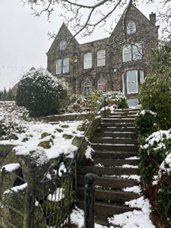
Craiglands Hotel (Ilkley): workshop location
Ilkley is a town in Yorkshire, north of England, renowned for its spa, beautiful views of the countryside and famous Cow and Calf rocks. One of the hotels in town, close to the beautiful natural landscape was the destination of our one week-long Writing Workshop, organised by my colleagues at the University of Leeds, which I helped planning a few months in advance and I was excited about part-taking. This would be my first research and writing event, lasting longer than one day, that I would take part in after the Covid-19 pandemic. On reflection, I can assert that the Writing Workshop week was one of the highlights of my fixed-term research role in the School of Languages, Cultures and Societies at the University of Leeds, role that is now coming to an end.
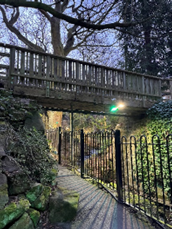
Mill Ghyll, Ilkley, UK
The aim of the workshop was to meet face to face with colleagues from Bangladesh, Nepal and the UK and to write together a number of papers as key outputs produced at the end of one of our large research projects. The Writing workshop was designed to be collaborative, interdisciplinary, and cross-team-based and the teams were made of colleagues across different institutions and countries, with each paper receiving input, feedback and comments from up to ten different co-authors or reviewers. By taking part in these cross-teams discussions I learnt first-hand information about the research fieldwork that was carried out in Nepal, for instance, and about the complexities and challenges of the health system, where formal and informal health services and health practitioners co-exist and pose questions about how best to work with local and national policy makers, stakeholders and communities to address such challenges. We also discussed about how further research is required to address the core beliefs of people in a plural health system. The former was a very useful discussion that informed one of the papers that I was co-writing. And the latter is an interesting research question that I found pertinent and exciting to explore from an anthropological perspective.
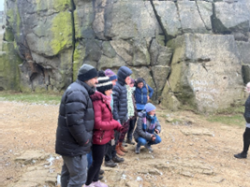
Team picture at the quarry (Cow and Calf rocks)
While co-writing papers was the key aim of the workshop, the week was planned in a way that allowed time and space for social and creative events. For instance, one of the activities that I found interesting was the creative start of each day, at 09.00 a.m. in a beautiful conference room overlooking the hills, with exploratory team games. The first day was particularly interesting, when every team member reflected on what they were hoping to achieve from this Writing Workshop. While the common goal was to produce research outputs and to finalise them in an accountable manner, with clear publication deadlines, individual aims evolved around getting to know other team members, exploring the town, climbing the rocks and going on walks on the surrounding hills. Nobody expressed a wish about having a lot of snow in the next few days. However, the weather decided otherwise and on the third day of our workshop, while climbing the Cow and Calf rocks, on a very windy and cold day, snowflakes started falling down.
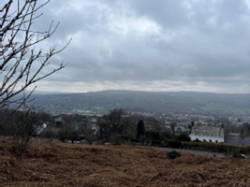
View of Ilkley from the restaurant
Despite this challenge, most of my colleagues, including those in their 60s and 80 years old managed to climb the rocks, an achievement which I found very inspiring. The reward for everyone’s efforts was a nice and warm lunch at a restaurant with a view of the hills, countryside and beautiful houses in the valley.
Getting to know the people I work with was also one of my social aims during this week. And I was hoping to do that especially over chat at lunch and dinner time. Talking to colleagues from across different countries, continents and teams, of different ages, and various levels of work experience was something that I found powerful and inspiring. For instance, I heard stories over dinner from colleagues who had worked in remote, mountain areas, where international staff members were facing serious safety concerns, especially women researchers. However, I also learnt about how these challenges have been dealt with in a brave, wise and diplomatic manner, with respect and sensitivity towards the local context, but with the final aim in mind: to deliver a programme aimed at improving women’s health. And some other social events took place spontaneously, such as having an unplanned, all ladies dinner out on the 08th March, at a warm and cosy local restaurant. Sharing personal stories during dinner was enjoyable and relaxing while the walk back to the hotel on an upward, hilly street was a little challenging after a heavy dinner.
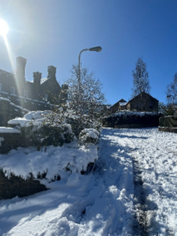
Snow covered Ilkley
During morning team games I got to know a little more about the personal likes of different team members, in terms of music, coffee, chocolate and food. Moreover, I had the chance to know colleagues who speak more than three languages on a daily basis, who play several musical instruments, and I heard stories about professional trajectories and future goals, such as further education associated with migration and mobility, that I could connect very well with. Some of these stories could not be completed during lunch time, and we were left with the promise of meeting again to finish telling the stories, perhaps over another Writing Workshop, at a different time, location or event.
The Writing Workshop week spent in the snow covered Ilkley left me with warm and pleasant memories and further aims: completing the paper that I was co-writing with my colleagues by the set deadline, which has been successfully achieved by the time of writing this blog.
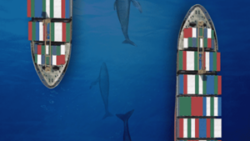
Vessels in the Panama Canal co-existing with migrating marine life (Source: Marine insight)
Moreover, on reflection, the Writing Workshop also taught me how to think about Time as having different dimensions and stages in one’s personal and professional life. And to better understand and navigate the emotional mind set associated with the end of a project, the positive sense of being part of a team and co-producing research outputs and the normalcy of that work coming to an end, since human life is all seasonal (Nyahuye, 2020), just like other forms of life that we co-exist with. It is alright to transition, to migrate and to be mobile, while appreciating the web of relationships we have made during our journeys. And seasons and mobility are a feature of our ecosystem, that humans are a small part of, which includes animals, marine life and the environment.
References:
Ilkley (2023), available at https://www.yorkshire.com/ilkley/, last accessed 05th May 2023
Marine Insight (2021), Panama Canal Resumes Seasonal Measures to Protect Migrating Marine Life, MI News Network, August 3, 2021, Shipping News, available at https://www.marineinsight.com/shipping-news/panama-canal-resumes-seasonal-measures-to-protect-migrating-marine-life/, last accessed 05th May 2023
Nyahuye, L. (2020), The artist and the prof, available at https://www.lauranyahuye.com/the-artist-and-the-prof, last accessed 05th May 2023
Dr Lidis Garbovan is a sociologist and social anthropologist who has previously worked with King’s College London and Birmingham City University on an ESRC-funded project about Covid-19 and ethnic minorities in the UK and with the University of Hull on the project Policy from Below, with migrant and refugee organisations.
Lidis joined COSTAR in October 2022 and has been working with colleagues to review and finalise publications and analyse emerging data from our early-stage activities in Nepal and Bangladesh. Her contact details on Twitter are: Lidis_LG.
